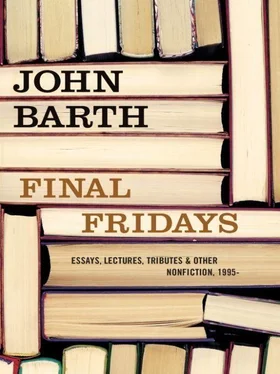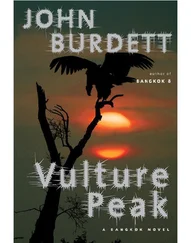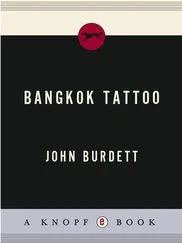The first murder in colonial Maryland, for example, as I dimly remember, occurred not long after Lord Baltimore’s settlers stepped ashore: Fellow killed his wife or vice-versa, I forget which or why. No court to try the offender in; no law to sentence him under, come to that; no jail to send him to — they’re still unloading and unpacking after months at sea, you know? And so with a figurative rap of the gavel (I like to imagine this taking place right on the beach of St. Clements Island, with the Arke and Dove still freshly anchored offshore) the Governor’s Council turns itself into a virtual legislature and in effect affirms that murder is against the law in the Province of Maryland; then turns itself into an inquest and takes depositions in the case; then turns itself into a court of law, tries the defendant, finds him guilty as charged (we’ll assume it was the man; it usually is), and sentences him to hang for his offense. Then, like mythical Proteus, they turn themselves back into the Governor’s Council and commute the sentence , lest in all this more or less desperate improvisation there have been some miscarriage of justice!
No doubt I’m improving this story a bit, but I swear I’m not making it up wholesale. The standard device of satire is supposed to be exaggeration, yet time and again I found myself having to tone down the historical facts of everyday life in the early colonies in order to make them plausible even in a satirical farce. Who would believe, for instance, that a boatload of mere rogues and renegades could sail up the river one fine afternoon while the provincial assembly was in session, bar the door of the assembly building with the members inside, and make off with the sterling silver Great Seal of Maryland? Well, something very like that happened — but at this remove, don’t ask me for the details. “History,” says Stephen Dedalus in James Joyce’s Portrait of the Artist as a Young Man , “is a nightmare from which I am trying to awake.” I, too, found it dreamish — more and more so as I left the history-textbooks and consulted the original documents — but I often woke up chuckling, and rolling my freshly-opened eyes.
IN THIS VEIN, by way of conclusion I might as well confess — acknowledge, insist, whatever — that some of the farthest-out bits of everyday colonial life in my version of The Sot-Weed Factor —bits that nearly all reviewers took for granted had been invented out of the whole cloth — happen to be literal transcriptions of (reported) historical fact. The infamous eggplant-aphrodisiac recipe, for example, that I thoughtfully provided Captain John Smith with for his defloration of the impregnable Pocahontas, you will find in a work entitled Untrodden Fields in Anthropology , by one Dr. Jacobus X, privately printed by the American Anthropological Society in 1934 or thereabouts. Doctor X was a 19th-century French army surgeon and amateur anthropologist who, during his service in sundry outposts of empire, developed what you might call a Phallic Index for men of various ethnicities, and who collected from his native informants such esoterica as that inflammatory African eggplant concoction, whose ingredients, preparation, and mode d’emploi I faithfully plagiarized in the novel, although I cannot vouch for its efficacy.
It is also true, however — as the earlier-mentioned (now late) poet Robert Graves acknowledged about his novelistic forays into classical Roman history — that a fictionist, working by hunch and feel, may invent period tidbits that historians subsequently discover to be factual. That happened with certain details of Graves’s I, Claudius , to the author’s delight, and I’ve known the same pleasure, though not in The Sot-Weed Factor . In another novel of mine, having to do with everyday life not in colonial America but in the household of Sindbad the Sailor, I needed a medieval Arabic slang term for the female genitals. My usually reliable supplier of naughty medieval Arabic is Scheherazade, but it happens that while her 1001 Nights abounds in slang terms for the male sexual equipment, I could find none for the female. Inasmuch as both Arabs and Persians of the period were intimate with the desert, I made an educated guess that the term wahat , one of several Arabic words meaning “oasis,” might just serve my purpose, and so deployed it (the word oasis itself, you’ll be excited to hear, is a Latin derivative from the same Egyptian root that wahat derives from; the two terms are etymological cousins). You will understand my subsequent joy upon reading an Arab-born British reviewer’s sniffy observation (in the London Times , I believe it was), that while I had misspelled the Arabic slang term for the male sexual organ (I had not; it’s a matter of transliteration and of dialect), I had got right the term for its female counterpart!
TWO CHEERS FOR the facts of history! say I, including the history of everyday life in early-colonial Maryland and Virginia. And three cheers for human narrative imagination, which ought properly to respect those facts, but which — when narrative push comes to dramaturgical shove — need not be bound by them like Jonathan Swift’s Gulliver hog-tied by the Lilliputians. “Black Bill” Claiborne let it be: Damn the torpedoes, and on with the story!
First delivered in the spring of 1998 as the University of Michigan’s annual Hopwood Lecture (in conjunction with their awarding to some promising U.M. student the Hopwood Prize in creative writing), this essay was published later that year in the Michigan Quarterly Review and subsequently collected with sundry others in The Writing Life: Hopwood Lectures, Fifth Series , 1edited and introduced by Nicholas Delbanco, himself an accomplished novelist and professor at the university.
HENRY DAVID THOREAU begins one of his lectures by saying, “You have invited me; you have engaged to pay me; and I am determined that you shall have me, though I bore you beyond all precedent.”
My resolve here is the same as Thoreau’s. The better to implement it, I’m going to serve me up to you by asking myself and replying seriously to a number of altogether unexciting questions — the first of which, reasonably enough, is “Why bother to do that?”
Well: The fact is that like many another American writer in the second half of the 20th century, I served my literary apprenticeship not in expatriate cafés or Depression-era boxcars or on the assorted battlegrounds of any of our several wars, but for better or worse in undergraduate and then in graduate school — majoring in, of all things, writing . Ernest Hemingway would disapprove; likewise, no doubt, Charles Dickens, Honoré de Balzac, Mark Twain, and many another alumnus of the School of Hard Knocks. So did I, for that matter, now and then, for it was on such writers that I was raised. But except for a sculpting uncle of mine who attended the Maryland Institute’s College of Art shortly before dying in the First World War, 2I was the first of my immediate family ever to “go past high school,” as people where I come from used to say (my older brother’s educational trajectory was detoured by the Second World War), and on the whole I regard my apprenticeship in académe as both benevolent and beneficial indeed, although even at the time I understood that literature had managed nicely for several millennia without the benefit of creative-writing programs and would doubtless continue to struggle along if they should all disappear tomorrow. (“At the time” here means the late 1940s, when the then-new program at Johns Hopkins was only the second degree-granting writing program in our republic — second after Iowa’s. At last count the number exceeded 400, I believe, 3but I stand by my proposition.) I shall circle back, perhaps, to a hedged defense of this almost uniquely American, post-World War II phenomenon, the college creative-writing program, and of the concomitant phenomenon of poets and fictionists as professors. I bring the matter up now in order to launch the following reminiscence by way of reply to Question #1: “Why bother, et cetera?” It is an anecdote I’ve told elsewhere; kindly indulge its twice-telling:
Читать дальше












